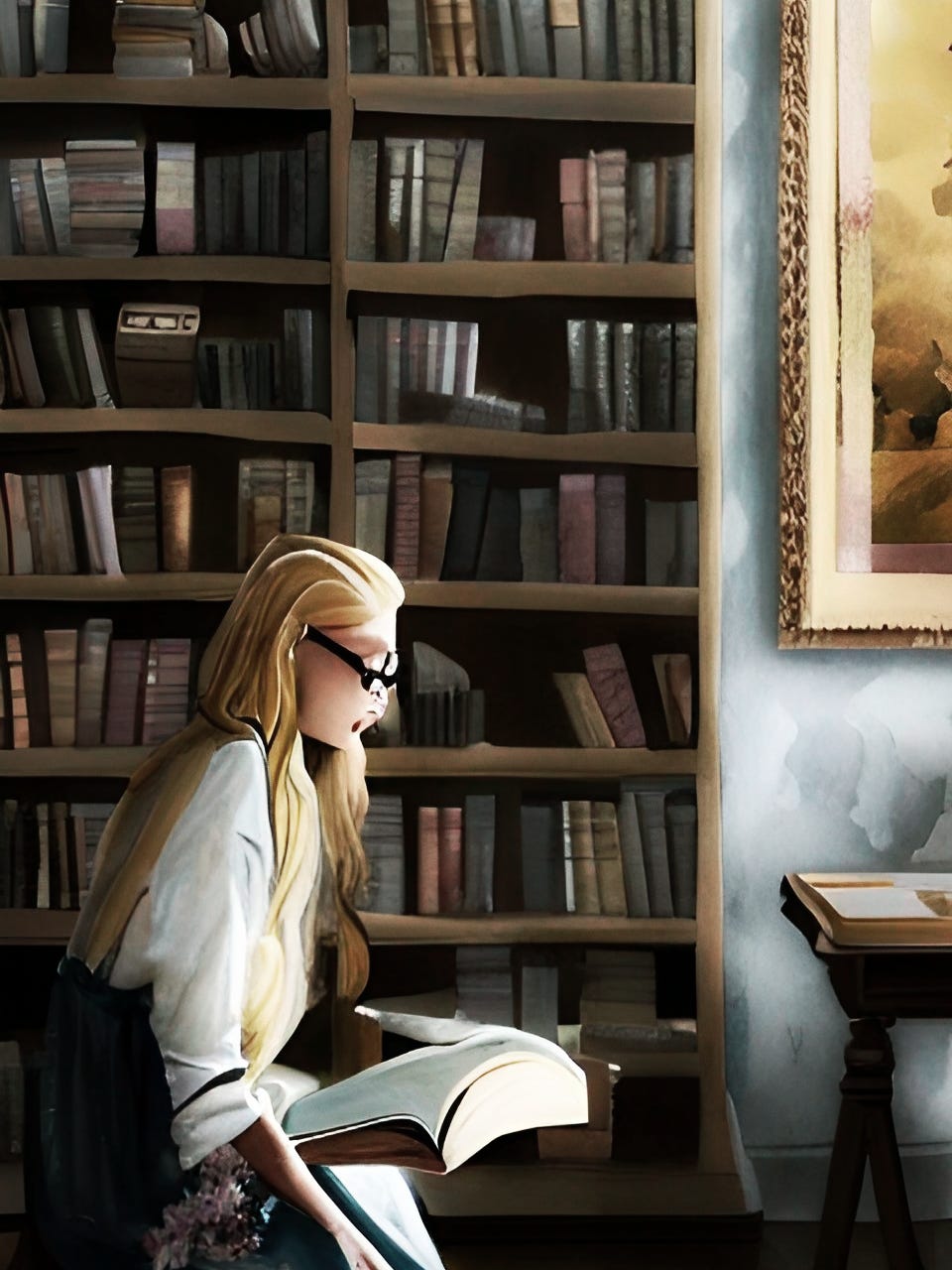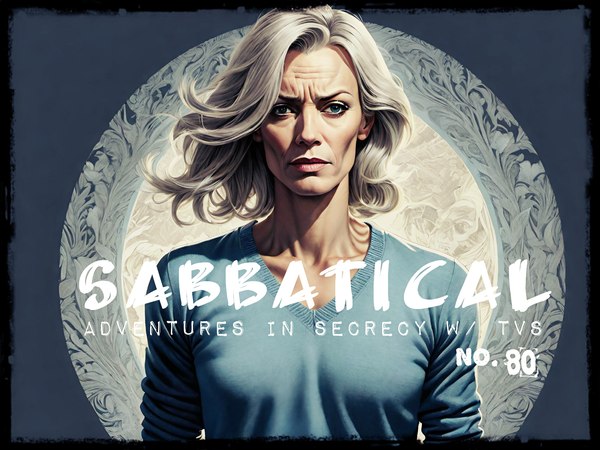The Ones We Keep
Dad gets back inside, gets seated and situated.
There’s college football on the beamtube. Mom put it on earlier.
Ordinarily—and by that I mean before his mind was damaged—he would be consumed by this game. He would quite possibly literally be getting up on the couch and yelling at the screen. In excitement, frustration, anticipation—whatever.
But today, he seems hardly aware it is on. If there is a particularly exciting play, he and Mason both look at it for a moment, but neither say anything or otherwise react to it.
While they are doing that, I am staring at the bookcases.
Mom once had quite a lot of books. In fact, Dad would complain about it every time they moved.
One such time, he had actually taken the time to calculate the cover prices of all the books and presented to me the total number of simoleons they’d spent on books over the years. I’d gently tried to explain to him that no one ever pays cover price for books—even new books, let alone used ones, of which she had many—and that a lot of these books had been gifts from me, as well as other folks.
But he’d made up his mine that they’d paid tens of thousands of dollars for all these books. This was bothersome to him, I can only presume why. It’s a bit of a thing, actually, so let me start a new paragraph.
Dad has a myth—or maybe more accurately now had—that he could have been a millionaire. We’ll set aside the datedness of his fantasy, seeing as how what he would really want to be is a billionaire, which is a scalability problem for most folks. He could have done this through professional golfing or through his singing talent. Maybe business. He did have a business degree but little acumen in the actual executive functions of business. He was a salesman, highly competitive, and perhaps an okay manager, but his real talent was in forming and maintaining working relationships with people. Through these efforts—most of which he’d plied for the ruthless CoDex Corporation—he’d earned a lot of money over the years. He’d not handled it well. He knew this. But, sadly, each time he would evaluate his handling of money, he would come to entirely wrong conclusions that always involved some get-rich-quick scheme or another. Or he’d make a series of good decisions, then wreck them by, say, giving all his retirement to my sister, or purchasing a rental property that was far outside of his manageable budget and had extremely predatory lending terms on the mortagge and with no knowledge of how owning a second home in another locality would affect taxation. Things like that.
Now, it’s no big deal. We all make these kind of mistakes. Very few of us understand the machinery and chicanery of the marketplace well enough to get really stinking rich, and that’s okay. At least, it’s okay for me, and it may (or may not) be for you. But for my dad, this was an abysmal state of affairs, a mark of shame and a rank indicator of his truest failure as a man.
I’ve always—or perhaps often is more honest—tried to be very patient with this. I know wealth and status are important to him, and I know that he’s never going to have the level of those things he desires. And this book thing is one expression of all that. It’s a bid for a do-over. Like if he could only have all that money back they’d spent on books, that would somehow lead to him being rich and famous.
All this had led—along with other things like aging, I guess—to the two of them paring down Mom’s book collection over the years. And this is what had caught my eye during the game.
I looked at the bookshelves and saw what she’d chosen to keep and what she’d chosen to give away.
Mom and I had an easier time growing up finding things in common, both of us enjoying subjects like philosophy & religion, psychology, mystery, and whatever. But now—me at forty-six and Mom at sixty-nine—I’m looking at the books and seeing almost nothing of interest. Not much in common.
Sure, there are a couple of title that flicker a bit. Like a book I gave her, or one from a college professor we both knew. But there’s tons of bible commentaries and contemporary Xtian books of different kinds. Lots of detective mystery thrillers by writers I would never read, much less own. And she wouldn’t have any easier a time at my bookshelves, pretty sure, even though I have a much more diverse catalogue.
“I don’t think I’m going to be around much longer,” Dad says.
I look at him with some focused sincerity, but try to make sure I’m still being gentle.
Then I ask, “Is that something you have some kind of knowing about, Dad? Or are you just worried about it?”
Dad appeared to think it over, then said, “I think I’m probably just worried about it.”
“Yeah,” I said. “All the doctors say you are recovering well.”
He nods.
I go on, “You have to remember, dude, that you underwent a major surgery. Like it was a life saving operation. Had they been even an hour later, you might not have made it.”
“Really?” he asks.
“Yeah,” I say.
“I didn’t know that,” he said.
I look over at Mason to gauge how they’re doing.
Mason smiles. I can tell there’s some sadness there. And anxiety, always anxiety. But they seem mostly all right.
Dad gets up. It’s a hard task for him, but he manages it. I help him by offering him my hands, bracing, and then letting him pull himself up. That Mason is present is interesting cos it’s not entirely dissimilar to when they were learning to stand and walk.
We go for a lap through the house, going through the kitchen, then the dining room.
One of their cats juts a paw out—almost like she’s giving him a high five—and he stops to pet her, then continues his loop, back around through the other side of the kitchen, then back into the living room, where the TV and bookcases are.
He gets situated again, makes a sad face, then says, “I don’t think I’m going to be around much longer.”
I’m fairly certain he doesn’t recall our conversation, but I take a different approach this time. “How do you feel?”
“I feel terrible,” he says.
“Well, that makes sense, Dad. You’ve just had a major surgery. It hasn’t been that long.”
He nods.
We take another walk around the house. Mason follows along. I think they did before, too, but I know they did this time.
Again, we stop in the dining room, but not because of the cat. This time it’s because Dad is scared he’s going to lose balance and needs to rest. So I help him sit down at one of the chairs at the dining room table. I just turn it around facing away from the table, so it’s easier for him to get into.
Mason takes a seat behind him, at the table, puts their arms on the table, rests their face on their arms.
“I don’t think I’m going to be around much longer,” Dad says.
I ask Mason to go get something, so they aren’t in the room when I ask my question, “I mean … is that okay? Are you done with this life? Or are you wanting to recover and stick around a bit longer?”
By the by, it isn’t that Mason can’t handle this kind of convo. But Dad might not be able to, and it would be harder with Mason there. For Dad, I mean.
“I don’t know,” Dad says.
“Well that’s I okay,” I say pretty quickly. “It’s all right to not know right now. You don’t have to.”
He nods, then I help him up around the time Mason comes back.
We three, one from each generation, walk through the kitchen again, and back to the living room, sit him down again.
Dad needs to get up and switch from one seat to another every few minutes, so I help him do that. Then we go for another loop. Then he sits down again.
With a sigh, he says, “I don’t think I’m going to be around much longer.”
I smile a little. “I know, Dad.”
I think that’s going to be it, but he adds, “I mean … I would like to be. I’d like to stick around.”
“Well there ya go,” I say. “You know what you want.”
He nodded, looked at the TV. I don’t know he he understood what he was looking at or not.
It calls to mind an interview I saw once with a game designer who said that the person with the best memories wins at life. I wonder he would think that if he could no longer recall having said it, having ever thought it. Such a stupid thing to say, really.
And it makes my mind wander over all the human vanity and stupidity. All the effort we put into things we won’t remember—either later in this life or after. All the knowing better but not doing better. All the pointless suffering and egotism. This is where it ends. Maybe not so gradually as for Dad. But it’s the same for each of us.
I guess that’s a spoiler for some. But not for me, and I hope not for you.
To continue reading along the Dad path, click here.
Play procedures
- My best friend in this life once told me that they needed a memory I described to him. I said, “Well, now you do!” I don’t think he understood what I meant by that. Do you? If you’re him, sorry to put your business out there, bro, but I think it’s pretty benign, yeah?
- Are you competitive? Do you live to win something? My guess is that you will be tempted to give a kneejerk response to this. I suggest you take a moment—maybe several moments over many days or years—to consider this. It’s serious. We’re talking about the meaning of life. If you are keeping a journal, write about it. I wish you well and hope it helps you to let go of some pain and frustration, that you can live a more fully engaged life. If you’re not keeping a journal, I’m going to go ahead and suggest that you do, if only for this one exercise. It is, of course, like everything else in this endeavor, your choice.
- If you want something a little more game-like, you can count this scene toward unlocking the secret to time travel—provided, of course, that you know what that means. If you don’t, you cannot until you do.






